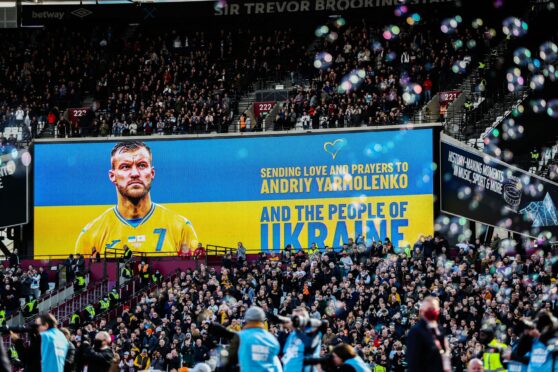
The International Paralympic Committee made a poignant statement on Thursday that seemed to perfectly sum up the conflicting emotions currently running through the sporting world.
Speaking on the U-turn decision to ban Russian and Belarusian athletes from competing at the Games, which began on Friday, Andrew Parsons said: “We are very firm believers that sport and politics should not mix. However, by no fault of its own, the war has now come to these Games and behind the scenes many governments are having an influence on our cherished event.”
Keeping a firm divide between politics and sport is a sentiment I’ve expressed many times, but I wholeheartedly agree the situation in Ukraine has gone too far for anyone – governments, sporting bodies, individuals – to stand in silence.
When the IPC initially said the 71 Russian and 12 Belarusian athletes attending the Games could compete as neutrals under the Paralympic flag, I knew instinctively it was the wrong decision. Of course, no one wants to see the Paralympians punished for the barbarism of Russia’s president, but the ensuing hostility within the competition would affect every competitor – not least the Ukrainian national team.
The IPC itself has admitted the situation in the athlete villages had escalated and ensuring the safety of everyone on the ground had become untenable. What’s more, the threat of boycotts from other countries meant there really was no other choice but to send the Russian and Belarusian athletes home. The Russians have appealed the decision, but there’s surely no way the Court of Arbitration for Sport will rule in their favour.
The Winter Paralympics has now rightly followed in the footsteps of many sporting bodies around the world. In football, Fifa and Uefa suspended all Russian international and club teams from competitions “until further notice”, including the World Cup playoff against Poland later this month.
The World Athletics Council has banned all athletes from its events, and The International Tennis Federation has suspended Russia from all of its team competitions.
And then there are the individual players and sports stars who have taken a stand, perhaps most notably Alexander Ovechkin, who was once one of Putin’s most outspoken supporters. Often hailed as the greatest hockey player of all time – ice hockey being of one Putin’s favourite sports – for Ovechkin to come out and publicly declare “Please, no more war” is huge. Yes, it is a somewhat feeble statement, but speaking out against Putin personally could have dangerous consequences for Ovechkin and his family.
When we see footage of tanks and bombs on the ground in Ukraine, and pictures of families fleeing their homes, it’s easy to dismiss sporting bans as unimportant. To me, that fails to recognise one very important point – for Putin, the most important thing is legacy, and sporting achievement has always played a pivotal role in his hunger to place Russia firmly on the world stage and in the history books.
By ostracising Russia, its oligarchs, billionaires, businesses and supporters from the sporting environment, we can show that the world is rallying together against his actions.
Sport has always had the power to unite the world and that unity, now more than ever, is needed to show Putin his actions have no place in the world we want now and in the future.
It’s shocking that MPs get a £2,200 pay rise as families struggle to buy basics
Just a few weeks ago, as the cost-of-living crisis first started to bite, Bank of England governor Andrew Bailey advised that workers shouldn’t ask employers for a big pay rise. He said there should be “quite clear restraint” in salary negotiations because restricting wage growth was key to keeping a lid on inflation and helping to stabilise the economy post-pandemic. It seems someone at the parliamentary spending watchdog forgot to read the memo.
Last week, it was announced MPs would get a £2,200 pay rise from next month, taking their salaries to £84,144. Meanwhile, the median annual pay for full-time employees, calculated by the Office for National Statistics, was £31,461 in 2020.
Yes, the decision was made by an independent body, but is it just me who thinks it’s ridiculous that politicians are getting a wage rise when so many of their constituents are struggling to make ends meet? Given the conditions we’re all living under – including the rapidly increasing cost of basic necessities such as food, energy and fuel – it does seem somewhat tone deaf. Quite a few politicians, including Liberal Democrat leader Ed Davey and Zara Sultana, Labour MP for Coventry South, spoke out about the pay rise, the latter insisting she would donate the extra money to a food bank and other local causes. That’s commendable, but the issue of tackling poverty and inequality in our communities should not rely on donations from MPs.
What’s more, it seems to me that if an independent committee has decided our leaders deserve a 2.7% pay rise, should there not be a similar process for assessing the salaries of nurses and other key workers? They certainly deserve the same consideration.

Enjoy the convenience of having The Sunday Post delivered as a digital ePaper straight to your smartphone, tablet or computer.
Subscribe for only £5.49 a month and enjoy all the benefits of the printed paper as a digital replica.
Subscribe